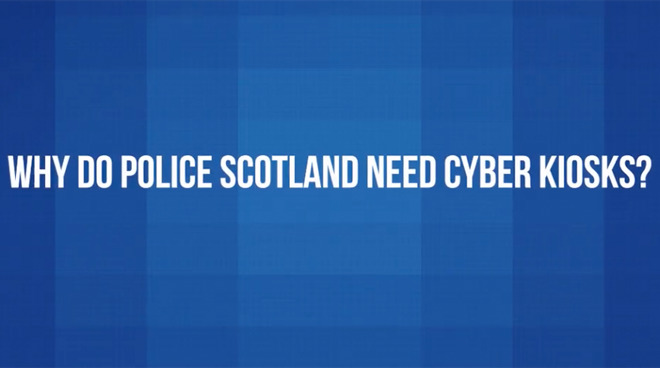Scotland police don't seem to have any problem getting data off locked iPhones
Starting on January 20, 2020, Scotland police will begin using "cyber kiosks" to extract and examine the contents of smartphones -- including iPhones -- that have data relevant to investigations or accidents.

The kiosks are desktop computers located in police stations that allow security officers to look through the contents of a mobile device rapidly. The data that can be extracted includes, but is not limited to, contacts, text messages, pictures, videos, plus text and application files.
These kiosks are highly scrutinized by several individuals and agencies for accountability of data and hardware. The devices of victims, suspects, and witnesses could all be extracted through these kiosks, regardless if the device has been volunteered or seized in the course of an investigation.
Scotland law already allows for law enforcement to take the smartphones of those involved in crimes and hold them indefinitely. Deputy Chief Constable Malcolm Graham has said that the kiosks will ideally speed up the process.
"By quickly identifying devices which do and do not contain evidence, we can minimise the intrusion on people's lives and provide a better service to the public," reads a statement on the Police Scotland website.
The kiosks draw a parallel to similar situations in the U.S., where law enforcement has increasingly tried to access digital data from smartphones, despite public wariness.

Attorney General William Barr with President Donald Trump
On January 13, the FBI and Attorney General William Barr demanded that Apple help unlock two iPhones believed to be owned by Mohammed Saeed Alshamrami. Alshamrani is suspected to be the shooter at an attack on the Naval Air Station in Pensacola, Florida.
The FBI has been granted permission to search the devices but has sought Apple's assistance in unlocking the smartphones, including one that was reportedly shot by its owner, in a bid to find more evidence. Apple declined to provide more help beyond what it has already given the investigation, as it would effectively undermine the security of its hardware and software.
Barr has claimed that Apple had provided no "substantive assistance" to the investigation. Apple had provided access to data from Alshamrami's iCloud account within 24 hours of the request, but nothing from the device's local storage, as it was not privy to that information.
The FBI and other security agencies have previously sought the assistance of third-party firms in earlier investigations involving iPhones. Most famously, this includes when the FBI hired Cellebrite to unlock the iPhone of the gunman involved in the San Bernardino case. The agency was reported to have spent $900,000 on the extraction, and said nothing about what it obtained.
However, separate law enforcement sources later said that the iPhone had yielded no pertinent information.
Since the San Bernardino case, Apple has created a page on its website specifically for law enforcement officials to request what data the company has.

The kiosks are desktop computers located in police stations that allow security officers to look through the contents of a mobile device rapidly. The data that can be extracted includes, but is not limited to, contacts, text messages, pictures, videos, plus text and application files.
These kiosks are highly scrutinized by several individuals and agencies for accountability of data and hardware. The devices of victims, suspects, and witnesses could all be extracted through these kiosks, regardless if the device has been volunteered or seized in the course of an investigation.
Scotland law already allows for law enforcement to take the smartphones of those involved in crimes and hold them indefinitely. Deputy Chief Constable Malcolm Graham has said that the kiosks will ideally speed up the process.
"By quickly identifying devices which do and do not contain evidence, we can minimise the intrusion on people's lives and provide a better service to the public," reads a statement on the Police Scotland website.
The kiosks draw a parallel to similar situations in the U.S., where law enforcement has increasingly tried to access digital data from smartphones, despite public wariness.

Attorney General William Barr with President Donald Trump
On January 13, the FBI and Attorney General William Barr demanded that Apple help unlock two iPhones believed to be owned by Mohammed Saeed Alshamrami. Alshamrani is suspected to be the shooter at an attack on the Naval Air Station in Pensacola, Florida.
The FBI has been granted permission to search the devices but has sought Apple's assistance in unlocking the smartphones, including one that was reportedly shot by its owner, in a bid to find more evidence. Apple declined to provide more help beyond what it has already given the investigation, as it would effectively undermine the security of its hardware and software.
Barr has claimed that Apple had provided no "substantive assistance" to the investigation. Apple had provided access to data from Alshamrami's iCloud account within 24 hours of the request, but nothing from the device's local storage, as it was not privy to that information.
The FBI and other security agencies have previously sought the assistance of third-party firms in earlier investigations involving iPhones. Most famously, this includes when the FBI hired Cellebrite to unlock the iPhone of the gunman involved in the San Bernardino case. The agency was reported to have spent $900,000 on the extraction, and said nothing about what it obtained.
However, separate law enforcement sources later said that the iPhone had yielded no pertinent information.
Since the San Bernardino case, Apple has created a page on its website specifically for law enforcement officials to request what data the company has.


Comments
Based on that link, they do acknowledge that they won't be able to access all phones:
On topic: I used to say it as a snarky aside, but now it seems more a stark reality to me. I think the feds are running a false flag operation on the populace. "We can't get in, we can't get in, oh noes, we can't get in." What I think they really mean is "it's harder to get in than we'd like it to be and a backdoor would increase our efficiencies." If the act is trivial to do, then it will be trivially done, imo.
Beautifully contradictory.
They simply wont be able to extract encrypted data from iPhones.
Other phones are wide open of course.
I think its stupid and unethical of ‘law enforcement’ to require Apple unlock specific iPhone data.
Its stupid because encryption is designed to be ‘unbreakable’, like asking water to go uphill.
Its unethical because a lot of people rely on absolute data safety because of human rights violating regime's (like China, Iran or the USA) and dare consequences of unlocking like death, maiming, prison, severe repercussions, etc.
If you’re on Zillow and you have claimed ownership of a house, your name and number are out there for these people to see.
"Q12. Can the police bypass PIN codes and passwords?
Sometimes. The ability to bypass security measures such as PIN codes varies depending on the make and model of the device, the version of the operating system being used, and any security measures enforced by the manufacturer. A specific answer regarding this can only be given on a case-by-case basis. PIN codes or passwords will only be bypassed where absolutely necessary to progress the investigation."
The kiosk's main purpose seems to be to provide quick and effective software tools to search a cellphone to which the police have already gained access by other means (owner consent, surveillance/observation, information received, unrelated cracking or jailbreaking software, etc.).
TL/DR version: These are not magic cracking kiosks.